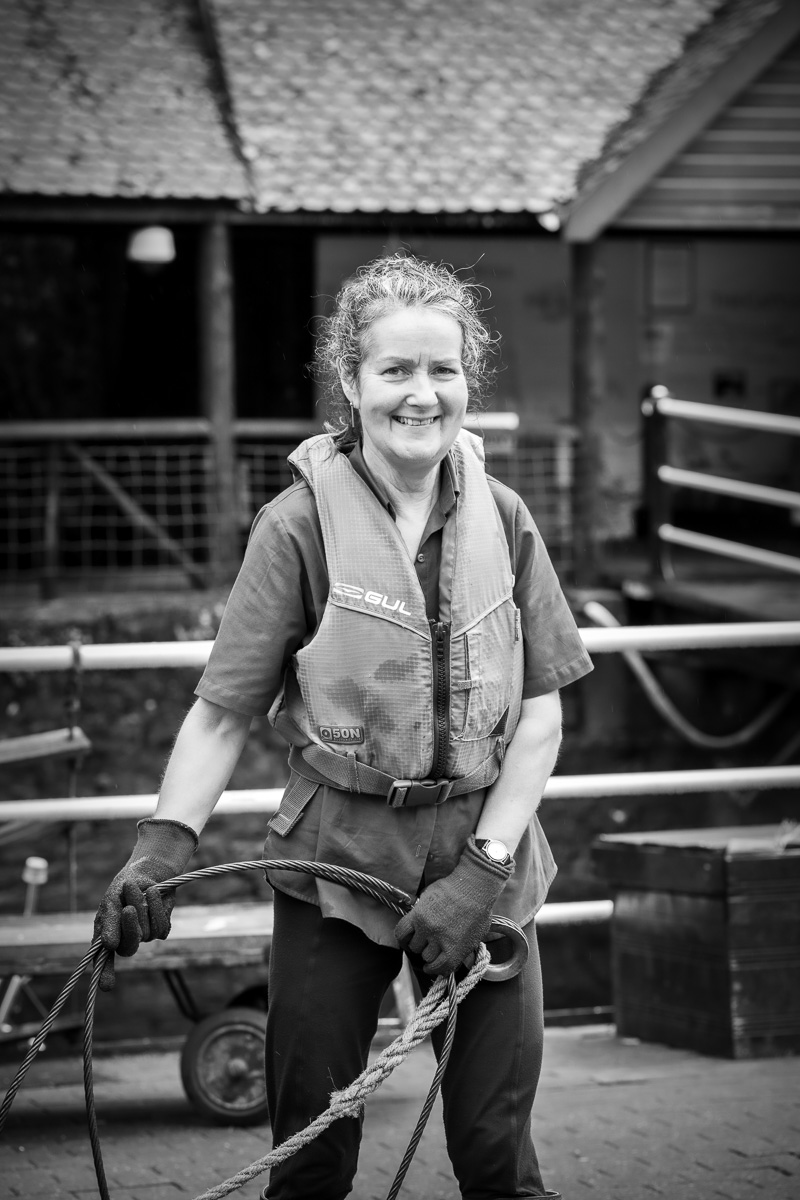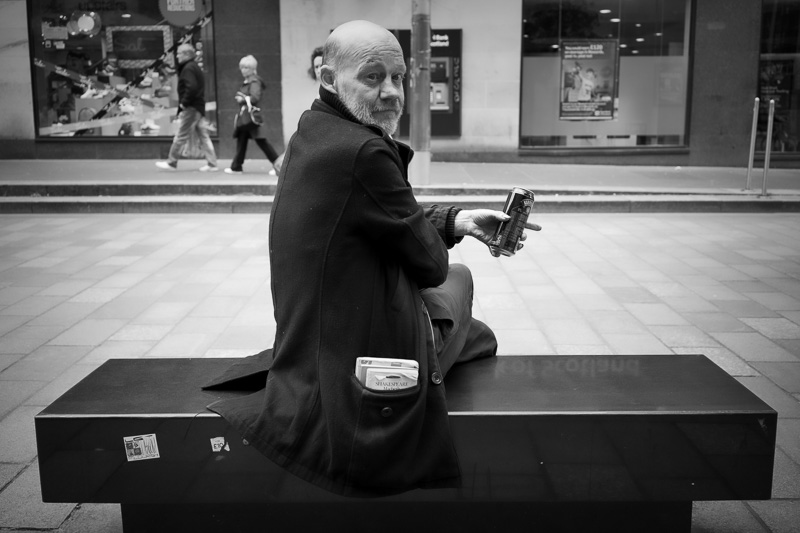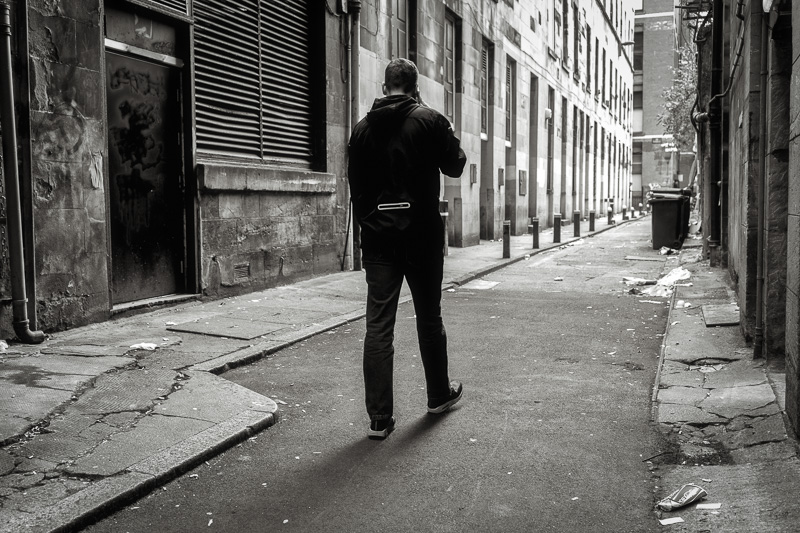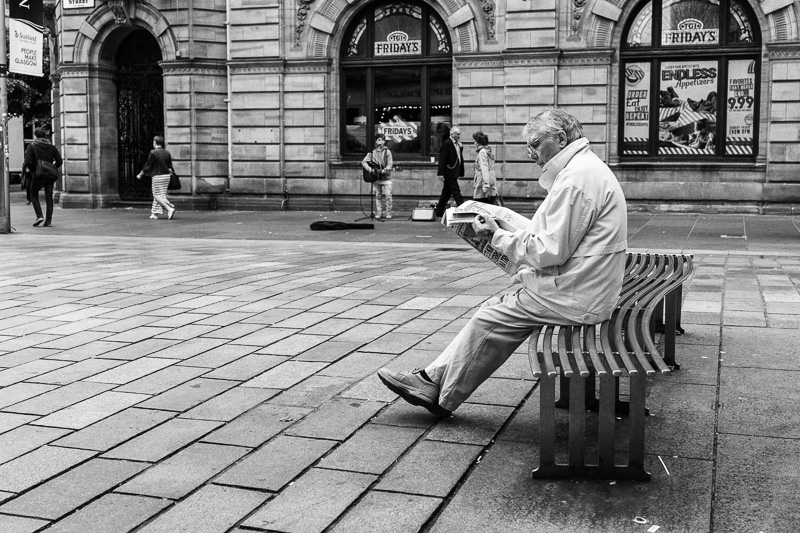While (or is it whilst?) visiting Glasgow & environs last week, I was introduced to the sitcom, Still Game (available on Netflix). It’s about two widowers who share a council flat on the outskirts of Glasgow. They frequent the local pub where they round out their geriatric adventures with a few pints and, like all Glaswegians, the more they drink, the broader their accent. There is banter that, to my North American ear, is incomprehensible. That pretty much matches my real-life experience as a guest in Kirkintilloch with a room full of locals chatting up their Canadian friend while polishing off a couple bottles of Laphraoig. Apparently, they were speaking my mother tongue. They themselves acknowledged that it might sound foreign to me. That’s an understatement. There were times when I thought I was on another planet.

I love to go into Glasgow for the street photography. One morning, while (or is it whilst?) ambling down Sauchiehall Street, I noticed a man on a bench who was engaged in an animated conversation with a can of lager. It was all in that broad Glaswegian accent so I had no idea what he was saying. I doubled back for a better shot, at which point he caught sight of me and turned. At first, I thought I had captured yet another Scotsman on his way to a day-long bender with a siesta in an alley. It wasn’t until later, when I examined the photo more closely, that I realized something else might be happening. You will note the books peeking out of his coat pocket. The closest is a dog-eared copy of Shakespeare’s MacBeth, the Scottish tragedy. He wasn’t having a conversation with his can of lager; he was reciting lines. It got me to thinking about the performances of MacBeth I’ve seen, how the leading role is always played by a grand Shakespearean actor delivering his soliloquies in the Queen’s English. But really, wouldn’t it be more true to life if MacBeth were seriously pissed and spoke in a broad incomprehensible Glaswegian?

Accents and dialects are local. Like a pin on a map, they fix a person to a particular region. I’ve read statements from other photographers who extol their craft as a kind of universal speech. They tell us that images are like music: they are accessible across cultures; they bridge barriers of language. I’m not sure that’s a virtue. Maybe universality is possible only when it engages us in acts of erasure. A man walks down an alley with a cell phone pressed to his ear. Click. I catch him as he passes. The resulting image is easy to read. Perspective lines draw our eyes to the lightest part of the image somewhere at the end of the alley. The man is following those lines to that light place. Lines of perspective are a universal phenomenon. The alley could be anywhere, Manhattan, Kowloon. The movement from darkness to light has a Jungian appeal. But the image erases the gritty particularity of that locale off Buchanan Street. The smell of an old industrial town. The speech into the cell phone. Low. Not posh, like in Edinburgh. The distinctive traces of a paradoxical place that rejected independence from the UK, but also rejected the UK’s call to leave the EU. My image trashes all of that and leaves you with a simple (almost numbingly stupid) message.

A man reading a newspaper raises similar issues. A mass-media rag owned by which corporate conglomerate? With headquarters where? Paying dividends to shareholders around the globe? It offers local news, but filtered through a formula that gets applied on every continent. I critique what I see, but how am I any better than the rag? I internalize big media’s visual formulas and filter everything I see, even everything I see critically, through its assumptions. In the background, a kid plays a guitar. Maybe he’s like me. Maybe he craves to maintain his status as an outlier, to sing with integrity, to honour his local culture. But he can’t help himself. He’s listened to too many top-40 radio stations (or the online equivalent). He’s internalized the demand for slick mediocrity.
